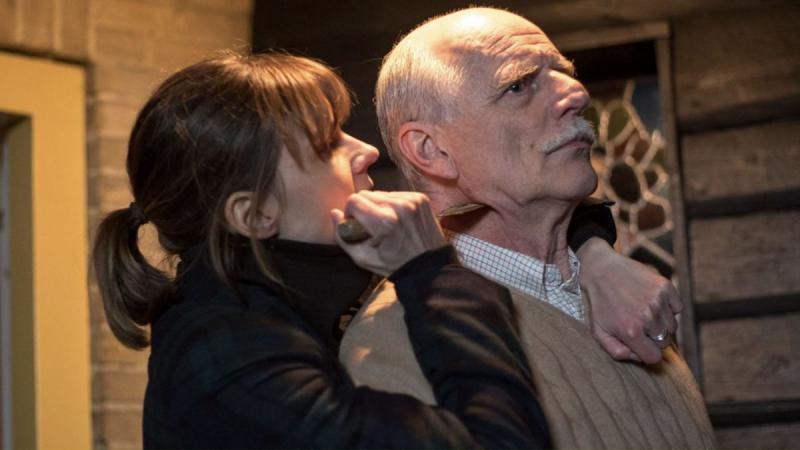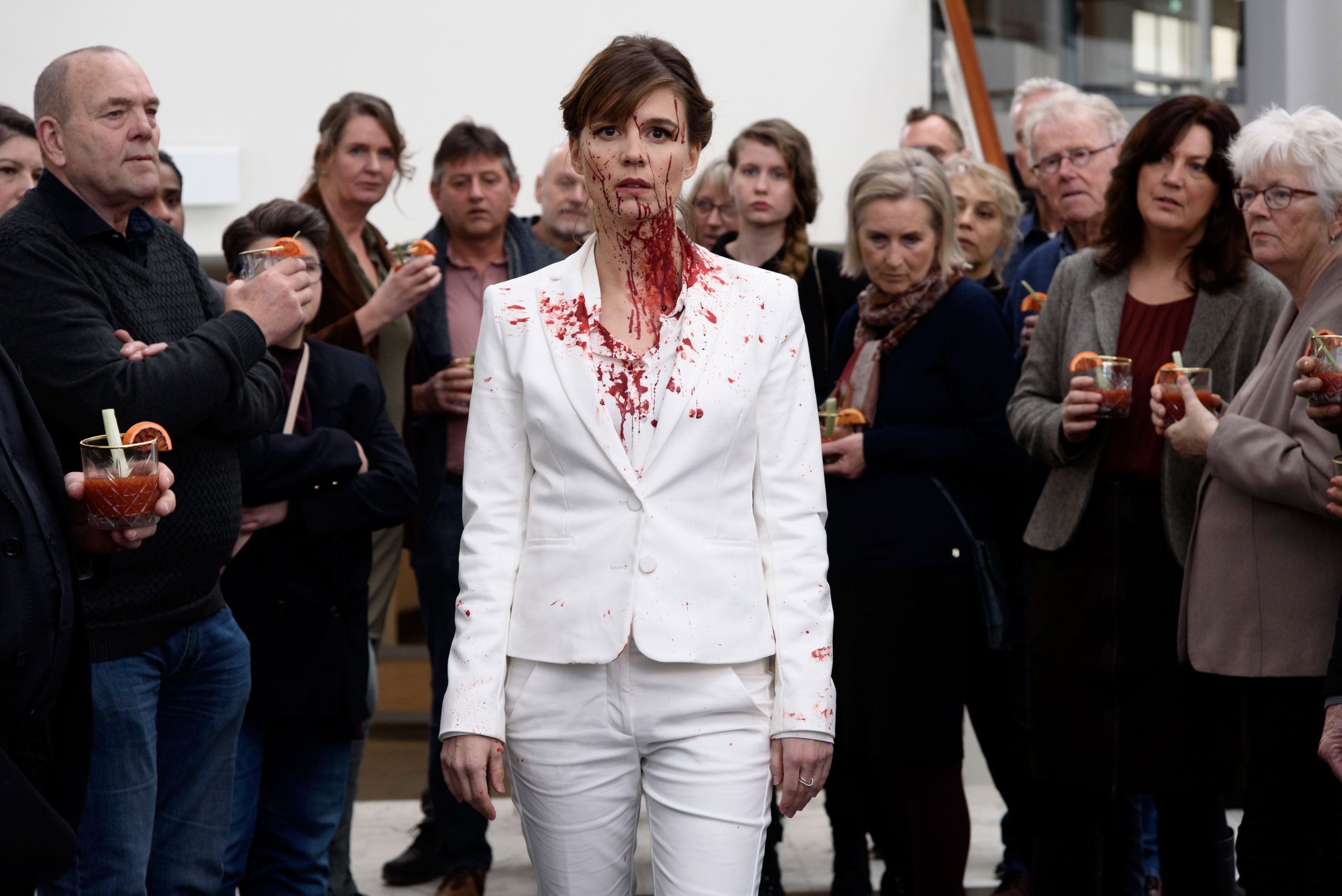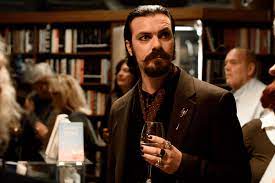The Columnist review - taking out the trolls | reviews, news & interviews
The Columnist review - taking out the trolls
The Columnist review - taking out the trolls
Sly horror comedy about a woman who's as mad as hell and isn't going to take it anymore

There aren't many unforgettable moments in The Columnist, but one occurs when the eponymous Dutch journalist Femke Boot (Katja Herbers) clambers from the skylight of her house and, unseen by her middle-aged neighbour (Rein Hofman), who's doing DIY on his roof, tips him to his death on his patio.
This first revenge slaying of a misogynist internet troll by Femke precedes others that turn her into an unrepentant serial killer – she collects the middle fingers she severs from the corpses – but bleed surprise and impact from writer Daan Windhorst and director Ivo van Aart's deadpan satire. If they'd restricted her to one or two murders and darkened the tone, The Columnist could have been as disturbing a thriller as, say, Paul Verhoeven's Elle (2016).
The overplayed joke here is that Femke is a nationally popular newspaper writer who, at the start, lives quietly in a cookie-cutter house with her 17-ish daughter Anna (Claire Porro). A personable, responsible woman deeply concerned about the spite and viciousness directed at women especially via social media, and the concomitant depletion of civility and kindness, she is one of the least likely people to embark on a killing spree. The point is that everyone has their breaking point.
 Femke's flaw is that she's addicted to her Twitter feed to the extent she's destabilised by the torrent of vile abuse – much of it anatomically specific and threatening rape – that's poured on her by the neanderthals who object to her outspoken opinions.
Femke's flaw is that she's addicted to her Twitter feed to the extent she's destabilised by the torrent of vile abuse – much of it anatomically specific and threatening rape – that's poured on her by the neanderthals who object to her outspoken opinions.
As well as the 40-something neighbour, a sausage-eating slob in his twenties and a shotgun-wielding married septuagenarian (main picture) are among those who were doubtless living curdled lives before they heard of Femke, and who make the mistake of thinking they can vilify her with impunity.
Before executing the old man, she destroys his model railway layout, which van Aart has clevely used to depict the middle-class suburbia they both inhabit. She does so with the same contempt for regressive masculinity with which the traumatised housewife and her imaginary adult son destroy her husband's layout in Dennis Potter's "Play for Today" Schmoedipus (1974) and Nicolas Roeg's film version Track 29 (1988).
LIke most film protagonists whose empowerment makes them tyrants, Femke eventually goes too far when she visits the working-class home of the tweeter who has labeled her a paedophile. Dressed all in white for her book launch party, Femke shoots one male there, misidentifying him as the perp in her lust for vengeance, and then presents herself in the bedroom of the guilty party, who has acted from ignorance, perhaps conditioned to do so, and doesn't deserve to pay the ultimate price (pictured above: Katja Herbers as Femke).
The film's exaggerativeness undercuts its message about the primacy of free speech in democratic societies and the damage the Internet has done by facilitating the kind of violent traducements that can terrify their targets, as well as make them traceable – an ill that Femke herself exploits. Following in her mother's footsteps, Anna has become a champion of free speech at her high school. It doesn't help her cause as a sympathetic character that she emphasises her arguments against censorship by lacing her campaign banners with the F-word and insultng a female politician, Neelie Kroes, primarily to antagonise her long-suffering headmaster.
 Never better than when humorously expressing quizzicalness through everyday mannerisms, Herbers (from TV's Manhunt, Westworld, and Evil) gives a typically understated performance as Femke, easing The Columnist from horror comedy toward tragedy (though it never quite gets there). Porro is good as the button-pushing Anna.
Never better than when humorously expressing quizzicalness through everyday mannerisms, Herbers (from TV's Manhunt, Westworld, and Evil) gives a typically understated performance as Femke, easing The Columnist from horror comedy toward tragedy (though it never quite gets there). Porro is good as the button-pushing Anna.
Ironically, given this is a feminist movie, the most likeable member of mother and daughter's household is the kohl-eyed author Steven played by Bram ven der Kelen (pictured above left) whom Femke acquires as her attentive live-in lover – always ready with tea and meals – having originally thought him a jerk when they faced off during a talk show.
Steven's reasonableness and kindness – which avail him nothing in a movie that's laudably unsentimental – might, of course, be attributable to the fact that The Columnist's writer and director are both men. Or is it that, unlike Femke, Steven has the leisure to be reasonable and kind since he's not a woman routinely called names like "de kuthoer" ("c__t-whore") – the film's Dutch title – by the men who wish her maimed or dead?
The future of Arts Journalism
You can stop theartsdesk.com closing!
We urgently need financing to survive. Our fundraising drive has thus far raised £49,000 but we need to reach £100,000 or we will be forced to close. Please contribute here: https://gofund.me/c3f6033d
And if you can forward this information to anyone who might assist, we’d be grateful.

Subscribe to theartsdesk.com
Thank you for continuing to read our work on theartsdesk.com. For unlimited access to every article in its entirety, including our archive of more than 15,000 pieces, we're asking for £5 per month or £40 per year. We feel it's a very good deal, and hope you do too.
To take a subscription now simply click here.
And if you're looking for that extra gift for a friend or family member, why not treat them to a theartsdesk.com gift subscription?
more Film
 Blu-ray: Wendy and Lucy
Down-and-out in rural Oregon: Kelly Reichardt's third feature packs a huge punch
Blu-ray: Wendy and Lucy
Down-and-out in rural Oregon: Kelly Reichardt's third feature packs a huge punch
 The Mastermind review - another slim but nourishing slice of Americana from Kelly Reichardt
Josh O'Connor is perfect casting as a cocky middle-class American adrift in the 1970s
The Mastermind review - another slim but nourishing slice of Americana from Kelly Reichardt
Josh O'Connor is perfect casting as a cocky middle-class American adrift in the 1970s
 Springsteen: Deliver Me From Nowhere review - the story of the Boss who isn't boss of his own head
A brooding trip on the Bruce Springsteen highway of hard knocks
Springsteen: Deliver Me From Nowhere review - the story of the Boss who isn't boss of his own head
A brooding trip on the Bruce Springsteen highway of hard knocks
 The Perfect Neighbor, Netflix review - Florida found-footage documentary is a harrowing watch
Sundance winner chronicles a death that should have been prevented
The Perfect Neighbor, Netflix review - Florida found-footage documentary is a harrowing watch
Sundance winner chronicles a death that should have been prevented
 Blu-ray: Le Quai des Brumes
Love twinkles in the gloom of Marcel Carné’s fogbound French poetic realist classic
Blu-ray: Le Quai des Brumes
Love twinkles in the gloom of Marcel Carné’s fogbound French poetic realist classic
 Frankenstein review - the Prometheus of the charnel house
Guillermo del Toro is fitfully inspired, but often lost in long-held ambitions
Frankenstein review - the Prometheus of the charnel house
Guillermo del Toro is fitfully inspired, but often lost in long-held ambitions
 London Film Festival 2025 - a Korean masterclass in black comedy and a Camus classic effectively realised
New films from Park Chan-wook, Gianfranco Rosi, François Ozon, Ildikó Enyedi and more
London Film Festival 2025 - a Korean masterclass in black comedy and a Camus classic effectively realised
New films from Park Chan-wook, Gianfranco Rosi, François Ozon, Ildikó Enyedi and more
 After the Hunt review - muddled #MeToo provocation
Julia Roberts excels despite misfiring drama
After the Hunt review - muddled #MeToo provocation
Julia Roberts excels despite misfiring drama
 Ballad of a Small Player review - Colin Farrell's all in as a gambler down on his luck
Conclave director Edward Berger swaps the Vatican for Asia's sin city
Ballad of a Small Player review - Colin Farrell's all in as a gambler down on his luck
Conclave director Edward Berger swaps the Vatican for Asia's sin city
 London Film Festival 2025 - Bradley Cooper channels John Bishop, the Boss goes to Nebraska, and a French pandemic
... not to mention Kristen Stewart's directing debut and a punchy prison drama
London Film Festival 2025 - Bradley Cooper channels John Bishop, the Boss goes to Nebraska, and a French pandemic
... not to mention Kristen Stewart's directing debut and a punchy prison drama
 London Film Festival 2025 - from paranoia in Brazil and Iran, to light relief in New York and Tuscany
'Jay Kelly' disappoints, 'It Was Just an Accident' doesn't
London Film Festival 2025 - from paranoia in Brazil and Iran, to light relief in New York and Tuscany
'Jay Kelly' disappoints, 'It Was Just an Accident' doesn't
 Iron Ladies review - working-class heroines of the Miners' Strike
Documentary salutes the staunch women who fought Thatcher's pit closures
Iron Ladies review - working-class heroines of the Miners' Strike
Documentary salutes the staunch women who fought Thatcher's pit closures

Add comment